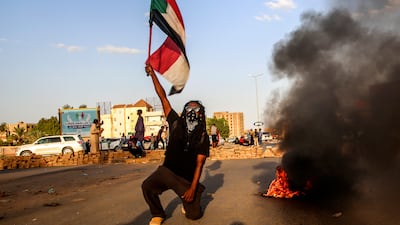The UAE, the US, Saudi Arabia and Britain expressed serious concerns on Wednesday over the situation in Sudan following last month's coup, calling for an immediate restoration of the civilian-led transitional government.
The four nations, known as the Quad of Sudan, said they stand “with the people of Sudan and emphasise the importance of supporting their aspirations for a democratic and peaceful nation".
“We endorse the international community’s serious concern with the situation in Sudan,” a joint statement read. “We call for the full and immediate restoration of its civilian-led transitional government and institutions.”
On Saturday, hundreds of thousands people protested across Sudan in rejection of the military power grab.
“The protests of October 30 demonstrated the depth of the Sudanese people’s commitment to advancing their country’s transition and we remain committed to helping them achieve these aspirations,” the statement read.
The Quad also called for all those detained in the coup to be released.
Sudanese Prime Minister Abdalla Hamdok remains under house arrest and others from his government have been detained.
Mr Hamdok has agreed to a conditional return as the head of a new government, a senior adviser to the ousted prime minister told The National on Wednesday.
His return is dependent on terms set by him, including the release of all political detainees and the reinstatement of the constitutional declaration, the adviser said.
The Quad called for dialogue between the various Sudanese factions and a commitment to the Juba Peace Agreement in restoring the civilian-led transitional government, which was meant to hold power until elections in 2023.
“This will help ensure Sudan reaches political stability and economic recovery so that it is able to continue the transitional period with the support of Sudan’s friends and international partners,” it said.
Both Saudi Arabia and the UAE hold political and economic leverage inside Sudan and have been involved in backchannel diplomacy to find a way forward after the coup.
Diplomatic efforts have so far focused on brokering a new arrangement between the military and the civilian leadership that could involve Mr Hamdok returning to power.
On Tuesday, US envoy to the Horn of Africa Jeffrey Feltman said Washington would support a Sudanese-brokered solution to the country's crisis.
For any resolution to work, Mr Feltman said “releasing all the detainees, allowing Prime Minister [Abdalla Hamdok] to do his job, [and] not be under house arrest are a priority”.
Sudan's top general and takeover leader, Gen Abdul Fattah Al Burhan, dissolved the Cabinet and the ruling military-civilian Sovereign Council, which had been charged with directing Sudan's transition to full civilian rule after the April 2019 overthrow of dictator Omar Al Bashir.
He also declared a state of emergency, detained Sudan's civilian leadership and suspended the work of a commission appointed by the civilian-led government in charge of dismantling the legacy of Al Bashir's 29-year rule.
The US suspended $700 million of assistance to Sudan following the coup.
Also on Wednesday, the tracking site Netblocks said internet access in Sudan has been limited for 10 days.













